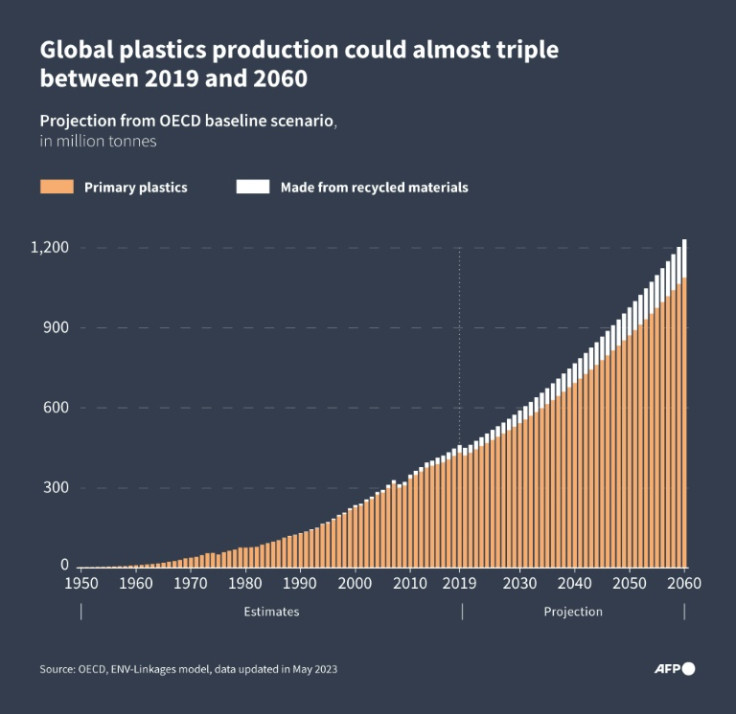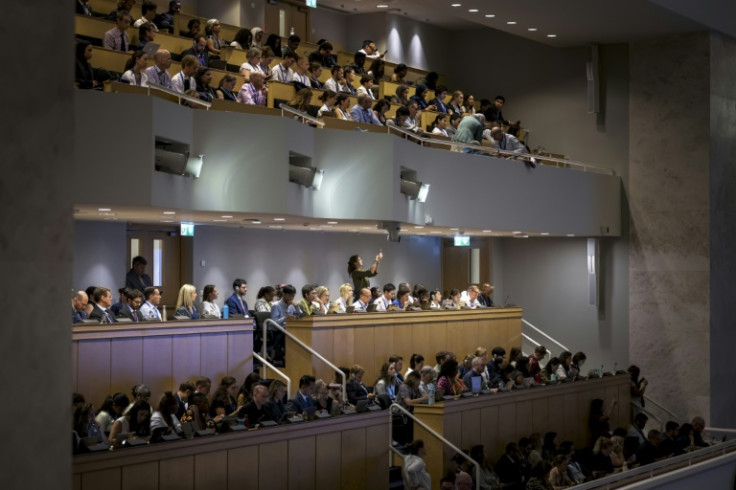Oil Industry Presence Surges At UN Plastic Talks: NGOs

Environmental NGOs are raising concerns about the growing presence of petrochemical industry lobbyists at talks to forge a global treaty to combat plastic pollution.
More than 180 countries are meeting at the United Nations in Geneva in a bid to thrash out a landmark agreement aimed at tackling the scourge of plastic pollution -- looking at the full life-cycle of plastic, from production to pollution.
The Center for International Environmental Law (CIEL) said it had counted 234 publicly disclosed fossil fuel and chemical industry lobbyists registered to attend the 10-day negotiations, which run until August 14.
Industry lobbyists "should not be able to attend these negotiations," CIEL's Rachel Radvany told AFP. They have "direct conflicts of interest with the goal of the treaty."
"Their interest is in maintaining plastic production -- and the industry is set to triple by 2060," she said.
Dubbed INC5.2, the talks resume the fifth session of the Intergovernmental Negotiating Committee to develop a legally binding international treaty on plastic pollution, continuing negotiations that stalled last year in South Korea.
CIEL, a Washington- and Geneva-based non-governmental organisation which provides legal support to developing countries, scrutinises the lists of accredited participants provided by the UN.
It counted 104 fossil fuel and chemical industry lobbyists at the INC2 session in Paris in 2022; 143 at INC3 in Nairobi in 2023, and 196 at INC4 in Ottawa in April 2024.
There were 220 at the supposedly final INC5.1 in Busan in South Korea in November 2024, which failed to seal a deal.
The International Council of Chemical Associations (ICCA) confirmed they had 136 delegates at the talks representing the plastic, petrochemical and chemical manufacturing industries.
"While we are significantly outnumbered by the more than 1,500 NGO participants, we recognise and value the UN's commitment to broad stakeholder participation as vital to achieving our shared goal of ending plastic pollution," ICCA spokesman Matthew Kastner told AFP.
"Our delegates are here to listen to governments so we can understand the unique challenges they face and bring solutions."
Radvany recalled that for the World Health Organization's Framework Convention on Tobacco Control, adopted in 2003, tobacco industry representatives were not allowed in during the negotiations.
Green groups and have also long protested the heavy presence of oil, gas and coal lobbyists at annual UN climate talks. The burning of of fossil fuels is by far the main driver of global warming.
Beyond the 234 industry lobbyists CIEL has pinpointed in Geneva, INC5.2 has 3,700 registered participants and the NGO believes there are likely many more lobbyists operating more covertly within country delegations.
Some countries have delegates with titles like "third chemical engineer", which are not included in CIEL's count.
Their study also does not include representatives from plastic-consuming sectors such as the food and cosmetics industries, which are also heavily represented at the negotiations.
Another NGO, the International Pollutants Elimination Network (IPEN), denounced the limited seating for observers in the rooms where the technical details of the treaty are thrashed out, saying the chairs were "flooded by industry lobbyists" -- effectively preventing civil society from participating.
Greenpeace staged a protest on Thursday at the UN's main entrance gate, scaling up to the roof to unveil banners reading "Big oil polluting inside" and "Plastics treaty not for sale".
"Each round of negotiations brings more oil and gas lobbyists into the room. Fossil fuel and petrochemical giants are polluting the negotiations from the inside, and we're calling on the UN to kick them out," said Greenpeace delegation chief Graham Forbes.
"Corporate polluters that created this problem must not be allowed to stop the world from solving it."


© Copyright AFP 2024. All rights reserved.





















